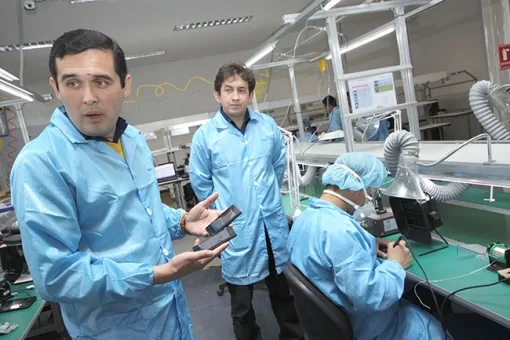Cuenca’s cell phone makers preparing for 4G technology; relaxation of import rules on some products help but they worry about others
Cuenca’s two smart phone makers, as well as five others in Ecuador, will soon be producing phones using the recently introduced 4G technology.
Pedro Cordero, Operations Manager at Hipertronics in Cuenca, says that the rules relaxation concerning the assembly of electronic boards, will speed the transition to 4G by reducing production costs. “Before, we were required to weld the parts of the boards in place in Ecuador,” says Cordero. “Now we can order them from China already assembled,” he said.
Andrés Tapia, geneal manager of Motsur Cuenca, which produces all Alcatel phones for South America agrees. “It not only reduced costs but saves production time,” he said. “In China they use robotics for the welding which we don’t have,” he adds.
In 2014, about one million low- to mid-range priced phones were produced in Ecuador, about half of them in Cuenca. The industry says it will double that number this year and produce more high-end phones, concentrating on 3G and 4G models.
Cordero says that Hipertronics is training personnel in production of new models. “Since we don’t have to do as much board assembly, which involves a tedious welding process, we can concentrate on other aspects of production, including upgrading to 4G.” he said, acknowledging that the upgrade involves a substantial investment in new equipment.
Hipertronics makes phones that are sold outside of Ecuador for a number of companies. Its Grun brand, sells in Cuenca for about $150. Cordero says the phone is comparable to imported smart phones that sell for three times as much.
Although Cordero, Tapia and others welcome the relaxation of rules for importing pre-assembled boards, they say they are concerned about other rules changes that increase the quota of imported phones allowed into the country. The recent agreement with the government and cell service providers Movistar and Claro to operate a 4G network, allows the companies to import more phones to sell as part of their service packages.
“We are unclear about the effect of more imports and we are in discussions with the government about this,” said Tapia. He adds that one of the incentives for Ecuadorian cell phone makers to expand production was the import restrictions imposed by the government. “We have made big investments to prepare to supply the local market and it is important that our market share is not reduced. If too many units are imported it could mean a reduction of production in our plants.”
Photo credit: El Mercurio.






















